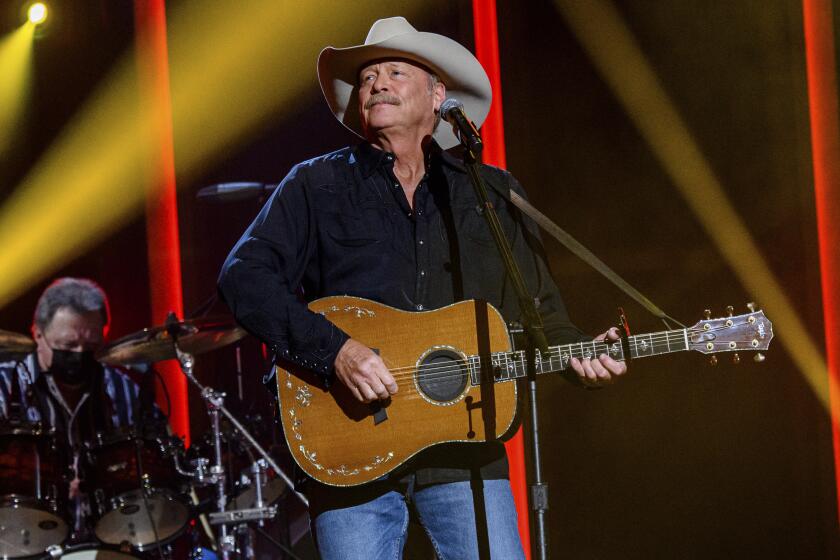Cuban Pianist Finally Finds U.S. Audience : Jazz: The late Emiliano Salvador was denied a visa to play in the U.S., but an independent label release of his last album has drawn critical praise.
- Share via
Those who know the music of Emiliano Salvador say he played the piano as if he had a demon inside, with the same kind of driving energy heard in the music of Thelonious Monk. They call him a man of extremes--too nervous, too intense, drank too much. And those who talk about his drinking and his dreams also call him one of Cuba’s finest jazz pianists.
For Carlos Puerto Jr., the bass player on his last album, he was simply the best. “He was the most original pianist Cuba has had, the man who best blended all the roots of Cuban music with American music,” said Puerto during a phone interview from his home in Cuba.
Salvador was a master at fusing traditional Cuban dance rhythms-- cha-cha-cha, charanga, danzon and mambo-- with traditional jazz elements, in what would be his stylistic trademark, a dynamic blend of old and new.
Why then, was this man, described as “terribly underrated” by his friend Paquito D’Rivera, not better known?
“He didn’t become more internationally famous because he was in Cuba, and he was ostracized (here),” says Arturo Gomez, musical director of WDNA-FM, a jazz station in Miami.
Gomez first heard Salvador in 1978, when he got hold of his first album, “Nueva Vision,” distributed by a Mexican label. “It had Arturo Sandoval and Paquito D’Rivera, and I just said, ‘This record is fantastic!’ ” Gomez said.
Salvador’s career began auspiciously. Born into a family of musicians (his father was a pianist), Salvador won a scholarship to study percussion at the Escuela Nacional de Arte in Havana but quickly switched to piano. He eventually hooked up with songwriters Pablo Milanes and Silvio Rodriguez, and together they initiated the revolutionary song-writing movement known as nueva trova.
Later, Salvador became Milanes’ pianist and arranger.
But once he branched out and started to record his own music, things began to sour, according to his brother Carlos, who now lives in Miami.
“He had many disappointments, his tours wouldn’t pan out, his contracts wouldn’t pan out. . . . The Ministry of Culture always promoted other artists.”
D’Rivera, who dedicated his album “40 Anos de Descargas Sonoras” to Salvador, says the pianist was “ignored by the Communist cultural authorities.”
To make matters worse, Salvador had another big problem: He drank. Reportedly, a lot.
“He was very musical, and very well regarded,” says Arturo Sandoval, “but he was very introverted, very insecure. He couldn’t go out on stage without drinking.”
Salvador’s problems were compounded when a hand injury took him out of the performance circuit for several years. When he was well enough to play again, he practiced like crazy, got the best engineer in the island and recorded his fifth album, “Ayer y Hoy,” in 1992.
“(Salvador) was very prepared,” says Puerto, the bassist. “Most of the album was recorded on first takes. The way you hear it is the way he played it the first time.”
Salvador was so pleased with the results, that, says his brother, “he told my mother, ‘After this record, Mom, I can die. This music will last forever.’ ”
One month later, he took a afternoon nap in his home in Puerto Padre, Cuba, and died of a heart attack in his sleep.
He was 41.
He left behind five brilliant recordings, of which his last one, “Ayer y Hoy,” is arguably the best.
But he would have surely remained largely unknown in the United States, where he was twice denied a visa to perform, had he not been heard by Ned Sublette, co-owner of QBADISC, an independent U.S. record label specializing in Cuban music.
“He was a monster, a monster,” says Sublette, who first heard Salvador play during a jazz festival in Havana in 1990.
Sublette was so impressed with Salvador that he expressed an interest in “Ayer y Hoy” even before it was recorded.
“When I heard (Salvador) had died, I wasn’t even sure he had finished the album,” said Sublette. But he did something unusual: Instead of waiting for “Ayer y Hoy” to be released in Cuba and licensing the existing recording, QBADISC leased the rights to the album and released it last summer.
Although the recording was made with limited resources, (there were only two studios to choose from, neither of which has cutting-edge technology), the quality is surprisingly good.
While Salvador had opted for a bigger sound with hefty horns in his past albums, in “Ayer y Hoy” he sticks to the essentials, with only bass, drums and Cuban percussion supporting the piano.
Always a sucker for old music, he recruited his friend Milanes (who, as an established Cuban musician was instrumental in getting studio time) to sing two old boleros. Otherwise, the album is pure Salvador, blending Cuban rhythms with jazz improvisations reminiscent of McCoy Tyner, Chick Corea and Chucho Valdez.
Testimony to Salvador’s appeal is the critical acclaim given to “Ayer y Hoy” and the fact that QBADISC plans to release “Nueva Vision,” his first album, as a CD.
Thus, in an ironic twist of fate, Salvador is finally getting the recognition he so wanted in the United States--the country he desperately wished to play in--two years after his death.
* “Ayer y Hoy” can be purchased in major record stores, or by contacting QBADISC, P.O. Box 1256, Old Chelsea Station, N.Y., N.Y., 10011. List price $14.98.
More to Read
The biggest entertainment stories
Get our big stories about Hollywood, film, television, music, arts, culture and more right in your inbox as soon as they publish.
You may occasionally receive promotional content from the Los Angeles Times.










